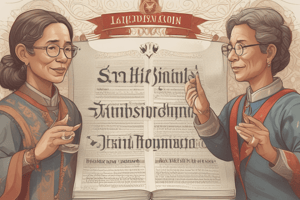Podcast
Questions and Answers
What is the primary duty of the Government according to the 1987 Constitution?
What is the primary duty of the Government according to the 1987 Constitution?
- To promote economic growth
- To regulate international trade
- To serve and protect the people (correct)
- To maintain peace through war
Civilian authority is subordinate to the military according to the 1987 Constitution.
Civilian authority is subordinate to the military according to the 1987 Constitution.
False (B)
What does the Philippines renounce as an instrument of national policy?
What does the Philippines renounce as an instrument of national policy?
war
The national territory of the Philippines comprises the __________ archipelago.
The national territory of the Philippines comprises the __________ archipelago.
Which of the following principles is adopted by the Philippines as part of its national policy?
Which of the following principles is adopted by the Philippines as part of its national policy?
Sovereignty resides in the government according to the 1987 Constitution.
Sovereignty resides in the government according to the 1987 Constitution.
What are the domains included in the national territory of the Philippines?
What are the domains included in the national territory of the Philippines?
Match the following articles with their main focus:
Match the following articles with their main focus:
What is the primary purpose for which the Government may call upon its citizens?
What is the primary purpose for which the Government may call upon its citizens?
The separation of Church and State is considered violable.
The separation of Church and State is considered violable.
What does the State recognize as a vital role in nation-building?
What does the State recognize as a vital role in nation-building?
The State shall promote social justice in all phases of ________ development.
The State shall promote social justice in all phases of ________ development.
Match the following sections to their main focus:
Match the following sections to their main focus:
Which policy does the Philippines adopt regarding nuclear weapons?
Which policy does the Philippines adopt regarding nuclear weapons?
The State values the dignity of every human person and guarantees full respect for human rights.
The State values the dignity of every human person and guarantees full respect for human rights.
What key areas does the State prioritize to foster patriotism and nationalism?
What key areas does the State prioritize to foster patriotism and nationalism?
The State shall pursue an independent foreign policy that considers national ________, territorial integrity, and national interest.
The State shall pursue an independent foreign policy that considers national ________, territorial integrity, and national interest.
Which of the following is NOT mentioned as an essential element for the enjoyment of democracy?
Which of the following is NOT mentioned as an essential element for the enjoyment of democracy?
Flashcards are hidden until you start studying
Study Notes
Preamble
- Establishes the foundation of the Philippine Constitution, embodying aspirations for justice, democracy, and a government serving the common good.
- Emphasizes a commitment to independence, equality, peace, and rule of law.
Article I: National Territory
- Defines the national territory as the Philippine archipelago, including all islands, waters, and territories under Philippine sovereignty.
- Encompasses terrestrial, fluvial, aerial domains, territorial sea, seabed, subsoil, and insular shelves.
- Internal waters include all waters surrounding, connecting, and between the islands of the archipelago.
Article II: Declaration of Principles and State Policies
Principles
- Democratic State: Sovereignty resides with the people; government authority stems from them.
- Renunciation of War: The Philippines renounces war as a policy tool, recognizing international law and promoting peaceful relations.
- Civilian Authority: Authority of civilian government is supreme over military, which exists to protect the State and its citizens.
- Government's Duty: The government is responsible for serving and protecting the populace, with citizens expected to uphold state defense if necessary.
- Maintenance of Peace: Essential for democracy; includes protecting life, liberty, property, and promoting general welfare.
- Separation of Church and State: Declared inviolable to ensure governance free from religious interference.
State Policies
- Independent Foreign Policy: Prioritizes national sovereignty, territorial integrity, and self-determination.
- Nuclear Policy: The Philippines seeks to maintain a nuclear-free status consistent with national interests.
- Social Order: The State aims to eradicate poverty and promote prosperity through adequate social services and employment.
- Social Justice: Emphasis on ensuring justice throughout national development phases.
- Human Rights: Guarantees full respect for human dignity and civil liberties.
- Family Protection: Recognizes family as a fundamental unit, protecting both the mother and unborn children; supports parental rights in youth development.
- Youth Involvement: Acknowledges the youth's role in nation-building, promoting their well-being and civic engagement.
- Gender Equality: Advocates for equal rights before the law for both women and men in society.
- Health Rights: Protection and promotion of public health, fostering health consciousness among citizens.
- Ecological Balance: Prioritizes a balanced and harmonious ecology as essential to national progress.
- Focus on Education and Culture: Invests in education, science, technology, arts, and sports to foster national identity and human development.
- Labor Economy: Labor recognized as a key economic force, with rights protections for workers being paramount.
- Self-reliant Economy: Advocates for a national economy fully controlled by Filipinos to encourage independence and economic sovereignty.
Studying That Suits You
Use AI to generate personalized quizzes and flashcards to suit your learning preferences.




